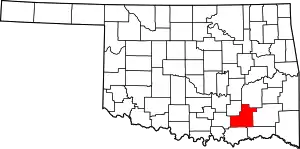Stringtown, Oklahoma
Stringtown is a town in Atoka County, Oklahoma, United States. The population was 410 at the 2010 census,[4] an increase of 3.5 percent from the figure of 396 recorded in 2000. It is the second largest town in Atoka County.
Stringtown, Oklahoma | |
|---|---|
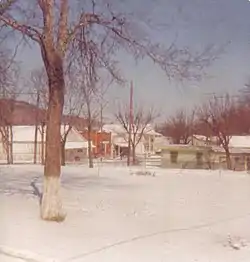 A view of the town in 1978 looking towards the old post office | |
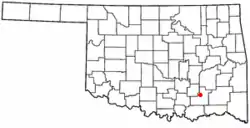 Location of Stringtown, Oklahoma | |
| Coordinates: 34°28′12″N 96°03′18″W | |
| Country | United States |
| State | Oklahoma |
| County | Atoka |
| Government | |
| • Mayor and Chairman of Water Department | Robert Smith |
| Area | |
| • Total | 5.44 sq mi (14.09 km2) |
| • Land | 5.39 sq mi (13.95 km2) |
| • Water | 0.05 sq mi (0.14 km2) |
| Elevation | 653 ft (199 m) |
| Population (2020) | |
| • Total | 419 |
| • Density | 77.79/sq mi (30.03/km2) |
| Time zone | UTC-6 (CST) |
| • Summer (DST) | UTC-5 (CDT) |
| ZIP code | 74569 |
| Area code | 580 |
| FIPS code | 40-70850[3] |
| GNIS feature ID | 2413343[2] |
The town is notable for the Mack H. Alford Correctional Center, a medium-security prison operated by the Oklahoma Department of Corrections, just outside Stringtown.
Geography
According to the United States Census Bureau, the town has a total area of 4.7 square miles (12.2 km2), of which 4.7 square miles (12.1 km2) is land and 0.077 square miles (0.2 km2), or 1.24%, is water.[4]
Stringtown is located at the southern intersection of U.S. Highway 69 and State Highway 43.[5]
History
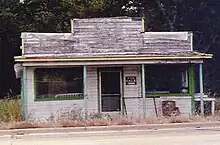
Sources differ as to the origins of the name: one suggests the original name was Springtown for a local sulphur spring but a spelling mistake labeled it Stringtown, while another suggests it got the name because businesses were strung out along the railroad tracks.[6] Once home to a bank, theater, and pub, the town has grown recently, both economically and in population. Companies noticing business opportunities in game hunting. population growth since the 1990 census and the addition of a new café have brought new life to the town. Annually in September, the Good Ole Days Festival celebrates the town's past with a parade, cookout, and concert.

A post office was established at Stringtown, Indian Territory on August 17, 1874. For a few weeks in July 1877 the official name of the post office was Sulphur Springs, Indian Territory. the present name is a modification of Springtown, the original name of the settlement. At the time of its founding, Stringtown was located in Atoka County, Choctaw Nation, a territorial-era government unit that included parts of today's Atoka, Coal, Hughes, and Pittsburg counties.[7]
On August 5, 1932, while Bonnie Parker was visiting her mother, Clyde Barrow and two associates were drinking alcohol at a dance in Stringtown (illegal under Prohibition). They were approached by Sheriff C. G. Maxwell and his deputy, at which time Clyde opened fire, killing deputy Eugene C. Moore. That was the first killing of a lawman by what was later known as the Barrow Gang, a total which would eventually amount to nine slain officers.
In the 1940s during World War II, Fritz Johann Hansgirg, the Austrian inventor of magnesium and heavy water processes was interned at the U.S. alien internment camp located in Stringtown.
In the late 1960s, a tornado touched down in the town directly on top of the (then) recently built Community Center, now the Senior Citizens Center. The tornado was only on the ground for a few seconds, but during that time the building was almost destroyed. It was an unusual occurrence for a tornado to touch down in the town itself, given its location between two chains of steep hills.
The nearby Mack Alford State Penitentiary is a large source of employment in the county. It was an internment camp for Japanese Americans arrested as "enemy aliens" and later for German POWs during World War II.[8][9]
Despite its small size, Stringtown (2010 pop. 410) is the second-largest town in Atoka County, behind Atoka (pop. 3,107) and ahead of Tushka (pop. 312). On January 14, 2014, the Oklahoma Highway Patrol disbanded the Stringtown Police Department for generating too much of the city’s revenue off of writing traffic tickets, a violation of the state "speed trap" law.[10]
The Garside house is one of the biggest historical sites of the town, next to the Bonnie and Clyde monument. The land the Garside house sits on was allotted to Joseph and Sarah Garside and their two children in 1902. In the middle of building the house, a tornado came through the town and tore down the part of the house that had been built. The Garsides had to start over again, but in 1915 they finished a two-story house. The house and land was later purchased by E. H. Colbertson, the first white man to buy land in that area. Approximately four years ago, the house was remodeled and decorated to be a museum.
The Southwest Stone Company, also known as the Rock Crusher, is one of the biggest sources of employment in the county. The crusher moved from Chockee to Stringtown in the early 1900s. Up until that point, Stringtown had not had electricity yet.
The railroad that runs through Stringtown stretches from south Texas, takes several routes in Oklahoma and Kansas, and reaches to the northern parts of Missouri. The part that runs through Stringtown was built in 1872 and is known now as the Union Pacific Railroad.
Stringtown was once home to a sawmill and a cotton gin that had the biggest production rate in the late 1800s. When a fire burnt the town on July 15, 1954, the sawmill and cotton gin burned down, along with half the town, including a café, a jailhouse, a barbershop, a bank, and a hotel. All that was left was Robert’s Store and a few homes. The town never really was rebuilt after this. Today, there is a school, a church, a fire department, City Hall, Dianna’s Store, and a senior citizens center.
Government and infrastructure
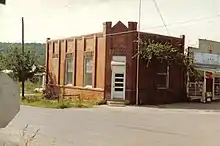
The United States Postal Service operates the Stringtown Post Office.[11]
The Oklahoma Department of Corrections operates the Mack Alford Correctional Center in an unincorporated area in Atoka County, near Stringtown.[12]
Demographics
| Census | Pop. | Note | %± |
|---|---|---|---|
| 1920 | 360 | — | |
| 1930 | 558 | 55.0% | |
| 1940 | 718 | 28.7% | |
| 1950 | 499 | −30.5% | |
| 1960 | 414 | −17.0% | |
| 1970 | 397 | −4.1% | |
| 1980 | 1,047 | 163.7% | |
| 1990 | 366 | −65.0% | |
| 2000 | 396 | 8.2% | |
| 2010 | 410 | 3.5% | |
| 2020 | 419 | 2.2% | |
| U.S. Decennial Census[13] | |||
As of the census[3] of 2000, there were 396 people, 166 households, and 113 families residing in the town. The population density was 83.7 inhabitants per square mile (32.3/km2). There were 217 housing units at an average density of 45.9 per square mile (17.7/km2). The racial makeup of the town was 69.95% White, 11.36% African American, 10.35% Native American, 0.25% Asian, 0.25% Pacific Islander, and 7.83% from two or more races.
There were 166 households, out of which 26.5% had children under the age of 18 living with them, 54.2% were married couples living together, 10.8% had a female householder with no husband present, and 31.9% were non-families. 28.9% of all households were made up of individuals, and 14.5% had someone living alone who was 65 years of age or older. The average household size was 2.39 and the average family size was 2.89.
In the town, the population was spread out, with 24.0% under the age of 18, 9.6% from 18 to 24, 21.2% from 25 to 44, 27.5% from 45 to 64, and 17.7% who were 65 years of age or older. The median age was 42 years. For every 100 females, there were 103.1 males. For every 100 females age 18 and over, there were 89.3 males.
The median income for a household in the town was $20,536, and the median income for a family was $22,614. Males had a median income of $19,643 versus $14,861 for females. The per capita income for the town was $9,612. About 15.1% of families and 25.1% of the population were below the poverty line, including 45.0% of those under age 18 and 30.9% of those age 65 or over.
Notable people
- Jerry Cantrell, guitar player for Alice in Chains
- B.A. Garside, executive director of United China Relief
- Reba McEntire, country singer
- Tyrus McGee (born 1991), basketball player in the Israel Basketball Premier League
- Crystal Robinson, former professional basketball player WNBA
- U.L. Washington, former professional baseball player
References
- "ArcGIS REST Services Directory". United States Census Bureau. Retrieved September 20, 2022.
- U.S. Geological Survey Geographic Names Information System: Stringtown, Oklahoma
- "U.S. Census website". United States Census Bureau. Retrieved January 31, 2008.
- "Geographic Identifiers: 2010 Demographic Profile Data (G001): Stringtown town, Oklahoma". U.S. Census Bureau, American Factfinder. Archived from the original on February 12, 2020. Retrieved July 16, 2013.
- Official State Map (Map) (2008 ed.). Oklahoma Department of Transportation.
- "Stringtown". Oklahoma Historical Society. Retrieved December 28, 2020.
- Morris, John W. Historical Atlas of Oklahoma (Norman: University of Oklahoma Press, 1986), plate 38; Shirk, George H. Oklahoma Place Names (Norman: University of Oklahoma Press, 1965), p. 199.
- "Stringtown (detention facility)" Densho Encyclopedia. Retrieved 2014-06-20.
- J. Burton, M. Farrell, F. Lord & R. Lord. Confinement and Ethnicity: An Overview of World War II Japanese American Relocation Sites, "U.S. Army Facilities: Stringtown, Oklahoma", (National Park Service, 2001); retrieved 2014-06-20.
- "New laws aim to put brakes on nation's speed traps", CBS News; retrieved May 03, 2017.
- "Post Office Location - STRINGTOWN", United States Postal Service; retrieved November 22, 2010.
- "Mack Alford Correctional Center Archived 2013-04-04 at the Wayback Machine", Oklahoma Department of Corrections; retrieved November 22, 2010.
- "Census of Population and Housing". Census.gov. Retrieved June 4, 2015.
